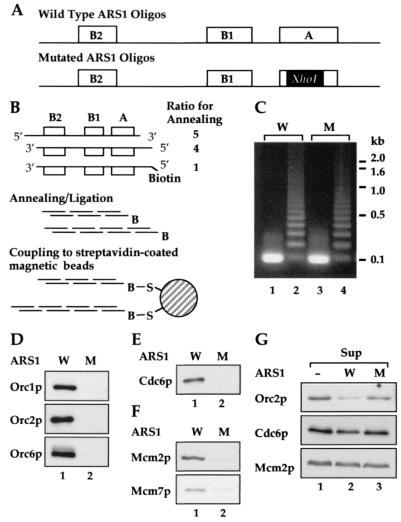Figure 1.
A cell-free system for the assembly of pre-RCs. (A–C) Preparation of ARS1 beads. (A) Complementary oligonucleotides for ARS1 beads. The positions of the A, B1, and B2 elements are indicated by open boxes. In the mutated ARS1 oligo DNA, 8 bp of the A element was replaced with an 8-bp XhoI linker sequence. (B) Preparation of ARS1 beads. See Materials and Methods for details. (C) Aliquots of annealed wild-type (W) and mutant (M) oligonucleotides, before (1 and 3) and after (2 and 4) the ligation, were run on an agarose gel and stained with ethidium bromide. (D–F) Assembly of pre-RC components on ARS1 beads. Whole-cell extracts prepared from YGP82 cells expressing Cdc6p were incubated with either wild-type (W) or mutant (M) ARS1 beads. (D) ORC loading. (E) Cdc6p loading. (F) Mcm loading. To examine the loading of Mcm7p, whole-cell extracts were prepared from YCD2 cells, and Mcm7p tagged with c-myc epitope was detected with the 9E10 antibody. (G) The levels of pre-RC components in reaction mixtures. After the incubation, samples were taken from the supernatants separated from the wild-type (ARS1 W) or mutant (ARS1 M) beads. A reaction mixture lacking ARS1 beads was constructed separately, and a sample was taken without an incubation (ARS1 −). The levels of pre-RC components were detected by immunoblotting (Sup).

